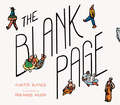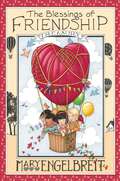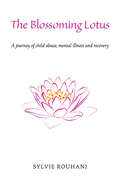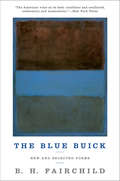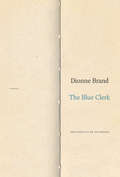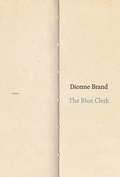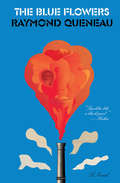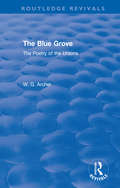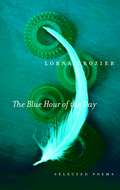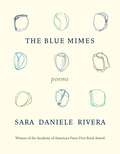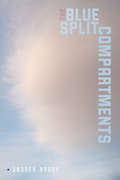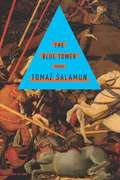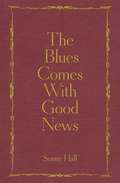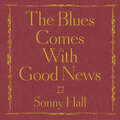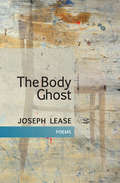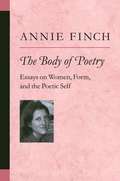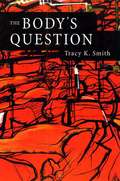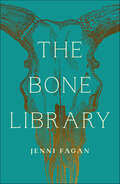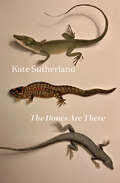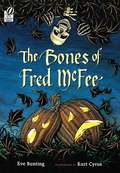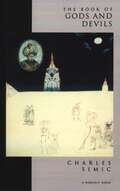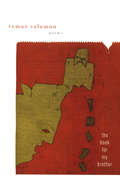- Table View
- List View
The Blank Page: How a Piece of Paper Connects to Everything
by Alberto BlancoIs a blank page really blank? Beloved poet Alberto Blanco pulls back the curtain and illuminates all of the elements hidden in a single piece of paper: the tree it was made from, the rain and sun that allowed the tree to grow, and the people that created it. An enlightening read for readers young and old, it soon becomes clear that a blank page contains the whole cosmos.In The Blank Page, world-renowned Mexican poet Alberto Blanco inspires children and adults to keep looking deeper, to never take things at face value. Charming illustrations by Rob Moss Wilson portray a world that slowly comes to life in a single sheet of paper: first the tree, then the forest, then the people are discovered, revealing the whole interrelated ecosystem of our world. As Blanco says: "Where nothing happens, there is a miracle we are not seeing."
The Blessings of Friendship Treasury
by ZondervanThe Blessings of Friendship, created by New York Times bestselling author and artist Mary Engelbreit, is a playful and poignant treasury of poetry, Bible verses, and quotes that celebrate the joy of friendship. Children will learn from timeless sayings and poems what it means to be a friend—helping, encouraging, listening, sharing with, and loving one another. Colorful and whimsical illustrations bring these words to life, as children learn the value of friendship. Verses from the Bible give us instruction on putting others above ourselves, loving each other, and being kind to one another. This book will make you smile with each turn of the page, remembering old friends and new friends alike.
The Blossoming Lotus: A journey of child abuse, mental illness and recovery
by Sylvie RouhaniEmbark on a transformative voyage of self-exploration and recovery with The Blossoming Lotus. Through moments of heartache, betrayal, hope, joy, poverty, despair, self-loathing, self-love, homelessness, and friendship, the writer learns to love all aspects of herself, recognising that, much like the Lotus Flower that flourishes in murky waters, all of us have the potential to mature into beautiful and powerful beings. This collection of poems, written over the past decade, represents a powerful and inspiring message of hope. ‘I hope you enjoy reading this collection. My prayer is for my messages to reach those who need them the most.’ Sylvie
The Blue Buick: New and Selected Poems
by B. H. Fairchild<P>"[B. H. Fairchild] is the American voice at its best: confident and conflicted, celebratory and melancholic."--New York Times <P>Gathering works from five of B. H. Fairchild's previous volumes stretching over thirty years, and adding twenty-six brilliant new poems, The Blue Buick showcases the career of a poet who represents "the American voice at its best: confident and conflicted, celebratory and melancholic" (New York Times). <P>Fairchild's poetry covers a wide range, both geographically and intellectually, though it finds its center in the rural Midwest: in oilfields and dying small towns, in taverns, baseball fields, one-screen movie theaters, and skies "vast, mysterious, and bored." Ultimately, its cultural scope--where Mozart stands beside Patsy Cline, with Grunewald, Gödel, and Rothko only a subway ride from the Hollywood films of the 1950s--transcends region and decade to explore the relationship of memory to the imagination and the mysteries of time and being. And finally there is the character of Roy Eldridge Garcia, a machinist/poet/philosopher who sees in the landscape and silence of the high plains the held breath of the earth, "as if we haven't quite begun to exist. That coming into being still going on." <P>From the machine work elevated to high art that is the subject of The Arrival of the Future (1985) to the despairing dreamers of Early Occult Memory Systems of the Lower Midwest (2002) to the panoramic, voice-driven structure of Usher (2009), Fairchild's work, "meaty, maximalist, driven by narrative, stakes out an American mythos" (David Ulin, Los Angeles Times). <P>From "The Blue Buick:" <br>A boy standing on a rig deck looks across the plains. <br>A woman walks from a trailer to watch the setting sun. <br>A man stands beside a lathe, lighting a cigar. <br>Imagined or remembered, a girl in Normandy <br>Sings across a sea, that something may remain.
The Blue Clerk: Ars Poetica in 59 Versos
by Dionne Brand<P>On a lonely wharf a clerk in an ink-blue coat inspects bales and bales of paper that hold a poet's accumulated left-hand pages—the unwritten, the withheld, the unexpressed, the withdrawn, the restrained, the word-shard. <P>In The Blue Clerk renowned poet Dionne Brand stages a conversation and an argument between the poet and the Blue Clerk, who is the keeper of the poet's pages. In their dialogues—which take shape as a series of haunting prose poems—the poet and the clerk invoke a host of writers, philosophers, and artists, from Jacob Lawrence, Lola Kiepja, and Walter Benjamin to John Coltrane, Josephine Turalba, and Jorge Luis Borges. <P>Through these essay poems, Brand explores memory, language, culture, and time while intimately interrogating the act and difficulty of writing, the relationship between the poet and the world, and the link between author and art. Inviting the reader to engage with the resonant meanings of the withheld, Brand offers a profound and moving philosophy of writing and a wide-ranging analysis of the present world.
The Blue Clerk: Ars Poetica in 59 Versos
by Dionne BrandDionne Brand, author of the Griffin Poetry Prize-winning collection Ossuaries, returns with a startlingly original work about the act of writing itself.On a lonely wharf a clerk in an ink blue coat inspects bales and bales of paper that hold a poet's accumulated left-hand pages--the unwritten, the withheld, the unexpressed, the withdrawn, the restrained. In The Blue Clerk award-winning poet Dionne Brand stages a conversation and an argument between the poet and the Blue Clerk, who is the keeper of the poet's pages. In their dialogues--which take shape as a series of haunting prose poems--the poet and the clerk invoke a host of writers, philosophers, and artists, from Jacob Lawrence, Lola Keipja, and Walter Benjamin to John Coltrane, Josephine Turalba, and Jorge Luis Borges. Through these essay poems, Brand explores memory, language, culture, and time, offering beautiful and jarring juxtapositions ("The Wire is the latest version of The Adventures of Huckleberry Finn"), and endlessly haunting language ("On a road like this you don't know where you are. Whether you have arrived or whether you are still on your way. Whether you are still at the beginning or at the end. You are in the middle all the time. What would be the sign?"). An essential observer and one of the most accomplished poets writing today, Dionne Brand's latest engages intimately with the act and difficulty of writing, the relationship between the author and the world, and the relationship between the author and art. Profound, moving, and wise in equal parts, The Blue Clerk is a work of staggering intellect and imagination, and a truly sublime piece of writing from one of Canada's most renowned, honoured, and bestselling poets.
The Blue Flowers
by Barbara Wright Raymond QueneauOnly a pataphysician nurtured lovingly on surrealist excess could have come up with The Blue Flowers, Queneau's 1964 novel. At his death in 1976, Raymond Queneau was one of France's most eminent men of letters--novelist, poet, essayist, editor, scientist, mathematician, and, more to the point, pataphysician. And only a pataphysician nurtured lovingly on surrealist excess could have come up with The Blue Flowers, Queneau's 1964 novel, now reissued as a New Directions Paperbook. To a pataphysician all things are equal, there is no improvement or progress in the human condition, and a "message" is an invention of the benighted reader, certainly not the author or his perplexing creations--the sweet, fennel-drinking Cidrolin and the rampaging Duke d'Auge. History is mostly what the duke rampages through--700 years of it at 175-year clips. He refuses to crusade, clobbers his king with the "in" toy of 1439--the cannon--dabbles in alchemy, and decides that those musty caves down at Altamira need a bit of sprucing up. Meanwhile, Cidrolin in the 1960s lolls on his barge moored along the Seine, sips essence of fennel, and ineffectually tries to catch the graffitist who nightly defiles his fence. But mostly he naps. Is it just a coincidence that the duke appears only when Cidrolin is dozing? And vice versa? In the tradition of Villon and Céline, Queneau attempted to bring the language of the French streets into common literary usage, and his mad word-plays, bad puns, bawdy jokes, and anachronistic wackiness have been kept amazingly and glitteringly intact by the incomparable translator Barbara Wright.
The Blue Grove: The Poetry of the Uraons (Routledge Revivals)
by W. G. ArcherOriginally published in 1940, The Blue Grove is a study of the poetry of the Uraons. This unique consideration of the poetry and folk song of the Uraons presents a wide range of poems organised by theme, including dance poems, cultivation poems, and marriage poems. It also includes examples of a Uraon marriage sermon, a Uraon farewell address, and Uraon riddles. The poems are preceded by a detailed analysis of Uraon marriages and dancing, providing important contextual information. The Blue Grove will appeal to anyone with an interest in the rich history of Uraon folk songs, poetry, and dance.
The Blue Hour of the Day: Selected Poems
by Lorna CrozierOver the course of a career spanning three decades, Lorna Crozier has become one of Canada's most beloved poets, receiving high acclaim and numerous awards, including the Governor General's Award, the Pat Lowther Poetry Award, and the Canadian Authors Association Award. Now, in this definitive selection of poems, which draws on her eight major collections and includes many of the poems for which she is justly celebrated, Crozier's trademark investigations of family, spirituality, love's fierce attachments, and bereavement and loss have been given a new framework. As a sapphire generates a blue light from within, The Blue Hour of the Day demonstrates Crozier's dazzling capacity to bring depths to light, unfailingly and unflinchingly. It represents the best work of an icon of Canadian poetry.From the Trade Paperback edition.
The Blue Mimes: Poems
by Sara Daniele RiveraSara Daniele Rivera’s award-winning debut is a collection of sprawling elegy in the face of catastrophic grief, both personal and public. From the lead-up to the 2016 presidential election through the COVID-19 pandemic, these poems memorialize lost loved ones and meditate on the not-yet gone—all while the wider-world loses its sense of connection, safety, and assurance. In those years of mourning, The Blue Mimes is a book of grounding and heartening resolve, even and especially in the states of uncertainty that define the human condition.Rivera’s poems travel between Albuquerque, Lima, and Havana, deserts and coastlines and cities, Spanish and English—between modes of language and culture that shape the contours of memory and expose the fault lines of the self. In those inevitable fractures, with honest, off-kilter precision, Rivera vividly renders the ways in which the bereft become approximations of themselves as a means of survival, mimicking the stilted actions of the people they once were. Where speech is not enough, this astonishing collection finds a radical practice in continued searching, endurance without promise—the rifts in communion and incomplete pictures that afford the possibility to heal.
The Blue Split Compartments (Wesleyan Poetry Series)
by Andrea BradyThe Blue Split Compartments is a complex and powerful sequence of lyric poems exploring how the physically intimate relationships between military drone operators and their victims are mediated, not only through the technological interfaces of the screen and drone, but also through language and subjectivity. Drawing on chatroom logs, military policy manuals, pattern of life archives, and accounts by witnesses around the world, these poems document the consequences of the perpetual and 'everywhere war' conducted from remote airbases, where pilots in shipping containers surveil and destroy remote 'objects'. Brady's approach offers a sophisticated interplay of diction, rhetoric, syntax, positioning, allusion, and sonic quality that generates legible currents of meaning and orientation. Entire countries have been turned into 'open air prisons', where the buzzing of drones overhead induces profound trauma and changes to social life. These poems strafe a documentary history of drone warfare with personal memory, and reflections on the myths and mechanics of prosthetic violence, voyeurism, masculinity, and desire. The Blue Split Compartments is a bitter comedy in drone erotics, a devastating reach into the twisted soul of murderous techno-surveillance regimes, a linguistically virtuosic and deeply humane x-ray of the discursive and militaristic systems that join us in mutual dissolution.
The Blue Tower
by Tomaz Salamun Michael BigginsThe work of this "eminent, still-wild spirit of Central Europe" (Publishers Weekly) continues to electrify. In The Blue Tower, language is remade with tenderness and abandon: "Rommel was kissing heaven's dainty hands and yet / from his airplane above the Sahara my uncle / Rafko Perhauc still blew him to bits." There is an effervescence and a sense of freedom to Tomaž Salamun's poetry that has made him an inspiration to successive generations of American poets, "a poetic bridge between old European roots and the American adventure" (Associated Press). Trivial and monumental, beautiful and grotesque, healing, ferocious, mad: The Blue Tower is an essential volume.
The Blue and the Gray
by Eve BuntingAs a black boy and his white friend watch the construction of a house which will make them neighbors on the site of a Civil War battlefield, they agree that their homes are monuments to that war.
The Blues Comes With Good News: The perfect gift for the poetry lover in your life
by Sonny HallSoul searching poetry for a new generation.Inspired by Diane di Prima, Rene Ricard, Henry Miller and others 'who tell it like it is', The Blues Comes with Good News is a collection of poems by prolific writer, Sonny Hall. The collection ranges from articulating addiction, self-destruction and identity, to romantic relationships, his journey to recovery and his unapologetic depiction of truth, through life and its happenings. At 18 years old Sonny entered a treatment centre for alcohol and drug addiction, after losing his biological mother - who he remained close to despite being adopted aged 4 - to a heroin overdose. Three months into his treatment, Hall started writing poems as a way of ordering 'all the madness' in his head. He has since written hundreds of poems, which all portray his newfound intimacy with life, figuring it out as he goes on, never failing to write sincerely about the sting of life, through a rare candour, explicit and seedy within the realms of his own indulgence. Illustrations by JACK LAVER
The Blues Comes With Good News: The perfect gift for the poetry lover in your life
by Sonny HallSoul searching poetry for a new generation.Inspired by Diane di Prima, Rene Ricard, Henry Miller and others 'who tell it like it is', The Blues Comes with Good News is a collection of poems by prolific writer, Sonny Hall. The collection ranges from articulating addiction, self-destruction and identity, to romantic relationships, his journey to recovery and his unapologetic depiction of truth, through life and its happenings. At 18 years old Sonny entered a treatment centre for alcohol and drug addiction, after losing his biological mother - who he remained close to despite being adopted aged 4 - to a heroin overdose. Three months into his treatment, Hall started writing poems as a way of ordering 'all the madness' in his head. He has since written hundreds of poems, which all portray his newfound intimacy with life, figuring it out as he goes on, never failing to write sincerely about the sting of life, through a rare candour, explicit and seedy within the realms of his own indulgence. Illustrations by JACK LAVER(P) 2019 Hodder & Stoughton Ltd
The Body Ghost: Poems
by Joseph LeaseIn this “spare, evocative” collection of poems from the prize-winning author of Testify, “both hope and despair are evident amid [the] music” (Publishers Weekly). “Promise me the rich can’t sleep,” Joseph Lease begs in The Body Ghost, offering poems as light on the page as nursery rhymes, and as powerful as prayer. The title work, which is “broken up into three separate poems, underlines the common thread weaved throughout his collection, the search for a silver lining amongst hardships” (Fourteen Hills). “Electric and electrifying, spontaneous and illuminating,” these poems conjure up the body in pain, the body politic in collapse, and the strength of all that connect us (Tablet).
The Body of Poetry
by Annie FinchThe Body of Poetry collects essays, reviews, and memoir by Annie Finch, one of the brightest poet-critics of her generation. Finch's germinal work on the art of verse has earned her the admiration of a wide range of poets, from new formalists to hip-hop writers. And her ongoing commitment to women's poetry has brought Finch a substantial following as a "postmodern poetess" whose critical writing embraces the past while establishing bold new traditions. The Body of Poetry includes essays on metrical diversity, poetry and music, the place of women poets in the canon, and on poets Emily Dickinson, Phillis Wheatley, Sara Teasdale, Audre Lorde, Marilyn Hacker, and John Peck, among other topics. In Annie Finch's own words, these essays were all written with one aim: "to build a safe space for my own poetry. . . . [I]n the attempt, they will also have helped to nourish a new kind of American poetics, one that will prove increasingly open to poetry's heart." Poet, translator, and critic Annie Finch is director of the Stonecoast low-residency MFA program at the University of Southern Maine. She is co-editor, with Kathrine Varnes, of An Exaltation of Forms: Contemporary Poets Celebrate the Diversity of Their Art, and author of The Ghost of Meter: Culture and Prosody in American Free Verse, Eve, and Calendars. She is the winner of the eleventh annual Robert Fitzgerald Prosody Award for scholars who have made a lasting contribution to the art and science of versification.
The Body's Question: Poems
by Kevin Young Tracy K. SmithThe debut collection by the Poet Laureate of the United States* Winner of the 2002 Cave Canem Poetry Prize *You are pure appetite. I am pureAppetite. You are a phantomIn that far-off city where daylightClimbs cathedral walls, stone by stolen stone. --from "Self-Portrait as the Letter Y"The Body's Question by Tracy K. Smith received the 2002 Cave Canem Poetry Prize for the best first book by an African-American poet, selected by Kevin Young. Confronting loss, historical intersections with race and family, and the threshold between childhood and adulthood, Smith gathers courage and direction from the many disparate selves encountered in these poems, until, as she writes, "I was anyone I wanted to be."
The Bone Library
by Jenni FaganThese poems are alive with electricity, pulsating with a frequency that vibrates throughout. In a journey from there to here, The Bone Library examines and interprets all of human life. Throughout the collection Jenni Fagan responds to broader themes of identity, of place, of love and the unloved. Written in the old Dick Vet Bone Library during the author’s time as writer-in-residence there, this is a vivid exploration that is honest and searching and cuts to the very core of what it is to be alive.
The Bones Are There
by Kate SutherlandZigzagging across the globe, Kate Sutherland's fourth book is poetry by way of collage: pieced-together excerpts from travellers' journals, ships' logs, textbooks and manuals, individual testimony, and fairy and folk tales that tell stories of the extinction of various species, and of the evolution of human understanding of—and culpability for—the phenomenon. Across its three sections, Sutherland draws identifiable connections between various animal extinctions and human legacies of imperialism, colonialism, capitalism, and misogyny, charting the ways in which they juxtapose one another while impacting the natural order of things.A trenchant critique of humanity's disastrous effects on this world, The Bones Are There is also a celebration of incredible creatures, all sadly lost to us. It honours their memory by demanding accountability and encouraging resistance, so that we might stave off future irrevocable loss and preserve what wonders that remain.
The Bones are There
by Kate SutherlandZigzagging across the globe, Kate Sutherland’s fourth book is poetry by way of collage: pieced-together excerpts from travellers’ journals, ships’ logs, textbooks and manuals, individual testimony, even fairy and folk tales that tell stories of extinction—of various species, and of our own understanding of, and culpability within, its process. Across its three sections, Sutherland draws identifiable connections between various animal extinctions and human legacies of imperialism, colonialism, capitalism, and misogyny, charting the ways in which they juxtapose one another while impacting the natural order of things.As much as it is a critique of humanity’s disastrous effects on this world, The Bones Are There is also a celebration of such incredible creatures, all sadly lost to us. It honours their memory by demanding accountability and encouraging resistance, so that we might stave off future irrevocable loss and preserve what wonders that remain.
The Bones of Fred McFee
by Eve BuntingA rhyming story about a toy skeleton at Halloween that provides menace and mystery.
The Book Of Folly
by Anne SextonAnne Sexton (November 9, 1928, Newton, Massachusetts - October 4, 1974, Weston, Massachusetts) was an American poet, known for her highly personal, confessional verse. She won the Pulitzer Prize for poetry in 1967. Themes of her poetry include her suicidal tendencies, long battle against depression and various intimate details from her private life, including her relationships with her husband and children.
The Book Of Gods And Devils
by Charles SimicLoneliness, loss, sadness, and mystery mark this wonderful volume of forty-nine poems by Charles Simic, winner of the 1990 Pulitzer Prize for Poetry and praised as “one of the truly imaginative writers of our time” by the Los Angeles Times.
The Book for My Brother
by Tomaz SalamunThis newest collection of poems from Tomaž Šalamun is exuberant, ambitious, and full of surprises. Here the devil is encountered and understood-I see the devil's head, people, I see his whole body . . . he longs for innocence, as we do. Here the poet juggles many tones, languages, and countries. Desire is evoked as both frustrating and exhilarating-I'm watered by longing, knocking myhead into the wall, on the ground, or I burn, burn,folded up on the couch.And memory comes back to remind us of the laws and experiences of childhood-Once again you are let loose in the seaonly after five o'clock in the afternoon to takea dose of sunlight like the ticking of the clock.At once daring and clear-voiced, The Book for My Brother is an extraordinary achievement.
